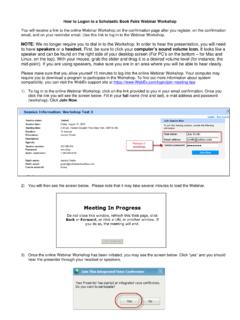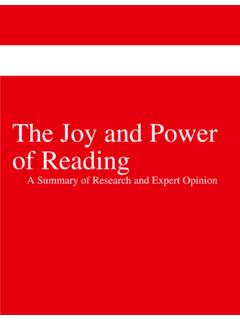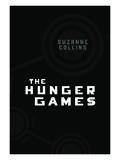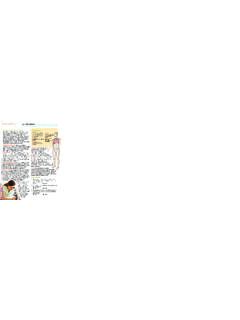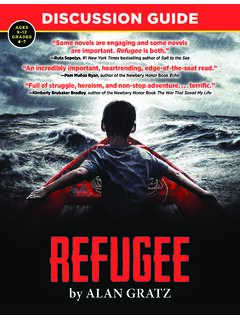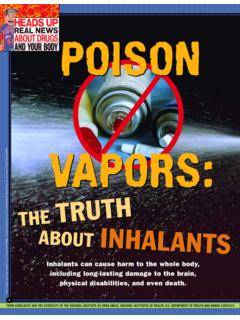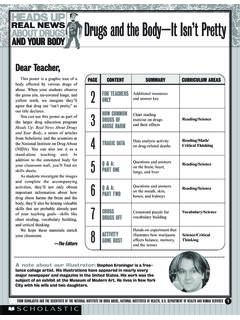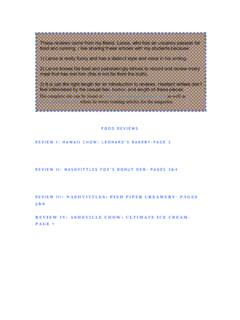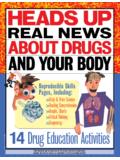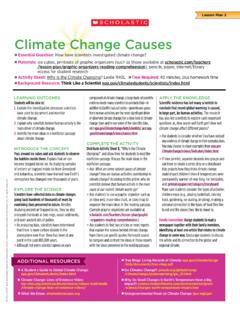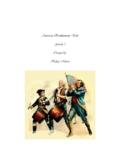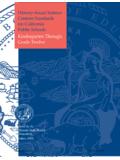Transcription of Dear Educators, Librarians, Parents, Readers, and Fellow ...
1 dear educators , librarians , parents , Readers, and Fellow revolutionaries , As I work on I Survived books, I'm always wishing that I could bring readers along with me on my research journeys. And finally my dream is coming true. I am writing with an invitation for you to join me on a virtual field trip to the Museum of the American Revolution, an amazing new museum in Philadelphia. The virtual field trip, called Beyond the Battlefield, is a 25-minute video extravaganza in which I take kids (and teachers!) behind the scenes of the museum. They will delve into the background of the Revolution and War of Independence. They will see historical treasures. They will meet historians and hear stories of young people like them who were a part of America's fight for freedom. Our goal is to bring this exciting and frightening time in history to life to your students, to supplement your curriculum, and to open new doors of curiosity. It's a great companion to my book I Survived the American Revolution, 1776 and pairs perfectly with a rich collection of ancillary resources, including my March/April Storyworks article Blood, Smoke, and Freedom (available in multiple reading levels), before and after viewing tips from our Top Teaching bloggers, a vocabulary list, and discussion questions.
2 I can't wait to hear what you think. Huzzah! (That's how they said hooray! in colonial times.). Lauren Tarshis Author of the New York Times Bestselling I SURVIVED Series Editor of StoryWorks and StoryWorks Jr. Magazines SCHOLASTIC and associated logos are trademarks and/or registered trademarks of Scholastic Inc. Beyond the Battlefield Virtual Field Trip FAQ. How can I incorporate the virtual field trip into How should I prepare my reader /students for the my plans? virtual field trip? The free virtual field trip can be used to augment Before the field trip, use the revolutionary a Revolutionary War or Colonial Times curriculum vocabulary handout in the Beyond the Battlefield unit, or as part of an ELA study on fiction/historical Classroom Kit to prepare students for the fiction/non-fiction. Or keep it on file for a substitute language and concepts that they will explore. day! After the field trip, use the grade level-specific What grade level is this appropriate for?
3 Discussion questions and answer keys in this kit to engage further with the themes and The Beyond the Battlefield virtual field trip is topics presented and extend their educational designed with supporting materials for grades 2 8, experience. but can be enjoyed by older viewers, too! Explore Lauren Tarshis's StoryWorks narrative How long should I schedule for the virtual field trip? nonfiction article Blood, Smoke and Freedom, . The actual viewing time is 25 minutes, but classroom about the experiences of one of the young engagement can be extended before and after soldiers featured in the virtual field trip viewing with activities, readings, and discussion (available for free in multiple reading levels). questions from this Beyond the Battlefield For grades 3 5, explore the additional Beyond Classroom Kit. the Battlefield classroom materials prepared by Scholastic Top Teaching blogger Genia Connell. How should I plan my viewing? For grades 6 8, explore the additional Beyond You can schedule your viewing in a number of ways: the Battlefield classroom materials prepared by watch independently, as a single class, across a grade Scholastic Top Teaching blogger Mary Blow.
4 Level, or multiple grades in a larger setting, such as an auditorium, library, or community center. Do my students need to read I Survived the American Revolution, 1776 before the virtual field What are the technical requirements for viewing? trip? The virtual field trip is a simple video played like any It is recommended (but not required) that you make other video on the internet. You will need access copies of I Survived the American Revolution, 1776. to the internet, audio capability, and, depending on available to students prior to the virtual field trip. crowd size, a projector for viewing. We recommend When paired with the virtual field trip, the book testing ahead and contacting your audio visual provides a fictional counterpart that will help solidify department as needed. students's understanding and comprehension of the revolutionary era and events, and help them feel more engaged and connected to the subject matter. The above blogs by Genia Connell and Mary Blow contain wonderful resources for exploring the book in your classroom.
5 Is there a hashtag for the virtual field trip? Yes! Please use #beyondthebattlefield. We'd love to see photos and hear reactions from your students, so be sure to include the hashtag and tag Scholastic in any social posts. REPRODUCIBLE. SCHOLASTIC and associated logos are trademarks and/or registered trademarks of Scholastic Inc. Key Revolutionary War Vocabulary colonies: areas that have been settled by people from another country and are controlled by that country colonist: a person who lives in a colony or helps create a colony ferried: carried from one place to another in a vehicle (such as a boat). memoir: a piece of writing in which a person describes his or her past experiences musket: a type of long gun used by soldiers from the 1500s to the 1800s regiment: a military unit made up of two or more large groups of soldiers slaves: people who are owned by other people and forced to work for them without pay enslaved: forced to be a slave territory: a large area of land wilderness: a wild and natural area in which few people live, such as a forest revolution: a drastic change in the way something is done Declaration of Independence: a document declaring the freedom of the 13.
6 American colonies from British rule. It was adopted on July 4, 1776. independent: not controlled by other people or things militia: a group of people who are trained to fight but are not official soldiers historian: a person who studies or writes about history Loyalist: during the time of the Revolutionary War, an American who was loyal to the king and did not want the 13 colonies to separate from Great Britain native peoples: the first people to live in an area, before the arrival of settlers or colonists To further your students's vocabulary discussion visit the multimedia slide show. REPRODUCIBLE. SCHOLASTIC and associated logos are trademarks Prepared by and/or registered trademarks of Scholastic Inc. Discussion Questions Grades 2 4. Directions: Watch the Beyond the Battlefield Virtual Field Trip, hosted by Lauren Tarshis. Then answer the questions below. 1. The field trip starts more than 250 years ago when America was made up of 13 colonies.
7 Who was in charge of the colonies? What made the colonists angry, and what did they do? (1:53 3:49). 2. Assistant Curator Matthew Skic says he thinks that July 1776 was the most important part of the American Revolution. What does he tell you about and show you that helps you understand why? (6:05 7:09). 3. What was the first battle that 15-year-old Josesph Plumb Martin fought in? What was important about this battle? (7:12 8:05). 4. Lauren and Matthew show you a number of items used by Revolutionary War soldiers, like Joseph. Choose one and describe what it's for. What do you find interesting about it? Choices: a. canteen (9:45); b. knapsack (10:19); c. pocketbook (10:41); d. musket (11:12);. e. cartridge box (12:16). 5. What was fighting in the war like for Joseph and other American soldiers? What challenges were they up against? (12:46 14:02). 6. Why did London Pleasants join the British army? (14:28 16:12). 7. What do you see and hear about the different types of people who were involved in the war?
8 (18:55 19:54). 8. Lauren says that many historians think the most remarkable part of George Washington's life . was when he was a general in the Revolutionary War. Why? (21:04 23:16). Think About It! After watching Beyond the Battlefield, what do you think is one important reason people fought for America's freedom in the Revolutionary War? Answer in a well-written paragraph on a separate sheet of paper. REPRODUCIBLE. SCHOLASTIC and associated logos are trademarks Prepared by and/or registered trademarks of Scholastic Inc. Discussion Answers Grades 2 4. Answers will vary but should be similar to: 1. Great Britain, ruled by King George III, was in charge of the colonies. The colonists became angry because they no longer wanted to be ruled by the British government. They wanted more control over their own laws and future. In 1775, American fighters went to war against the British. 2. Matthew Skic says July 1776 is important because that was when the Continental Congress signed the Declaration of Independence, announcing that the colonies would no longer be ruled by Great Britain.
9 He shows a copy of the Declaration in a newspaper, which is where most Americans would have found out about it. Matthew explains that this action allowed Americans to form a new kind of government that other countries had never tried before, ruled by regular people instead of a king or a queen. 3. The first battle that Joseph Plumb Martin fought in was the Battle of Brooklyn. This was the first major battle of the Revolutionary War, and it was the biggest one. 4. Answers will vary. 5. Fighting in the war was difficult and horrifying. Joseph saw other soldiers wounded and killed in bloody battles. The American soldiers were outnumbered by the British. The British also had better weapons. Plus, they had the help of experienced German soldiers called Hessians. 6. London Pleasants joined the British army because he had been enslaved on a plantation in Virginia, and the British offered freedom to enslaved people who would fight on their side.
10 London took the risk of running away to join the British, and after the war he became free. 7. You see African Americans, Native Americans, and women. They all participated in the Revolution in different ways. Free and enslaved African Americans fought on both sides of the war. Native Americans did also, depending on which nation they belonged to. Women were important for supporting the American troops. They cleaned and did laundry, and the soldiers wouldn't have survived without them. 8. Before the war, George Washington had a good life. He was not prepared to lead troops in battle. But he believed so strongly in the idea of freedom from Britain that he left his good life and took on the role of general. He failed at first, like in the terrible Battle of Brooklyn. But he kept fighting and finally led the Americans to victory. Think About It! Answers will vary, but students will probably mention people's desire to be free from Great Britain and rule themselves.
